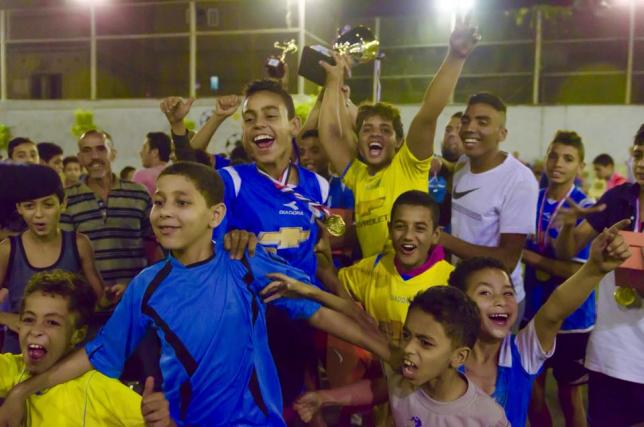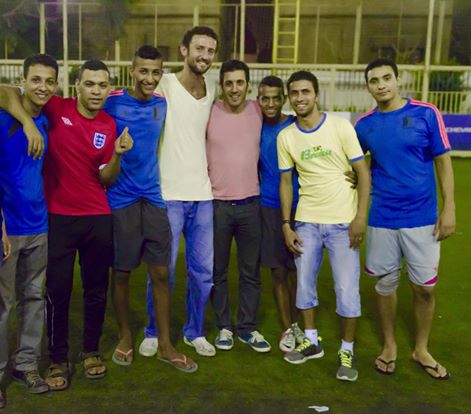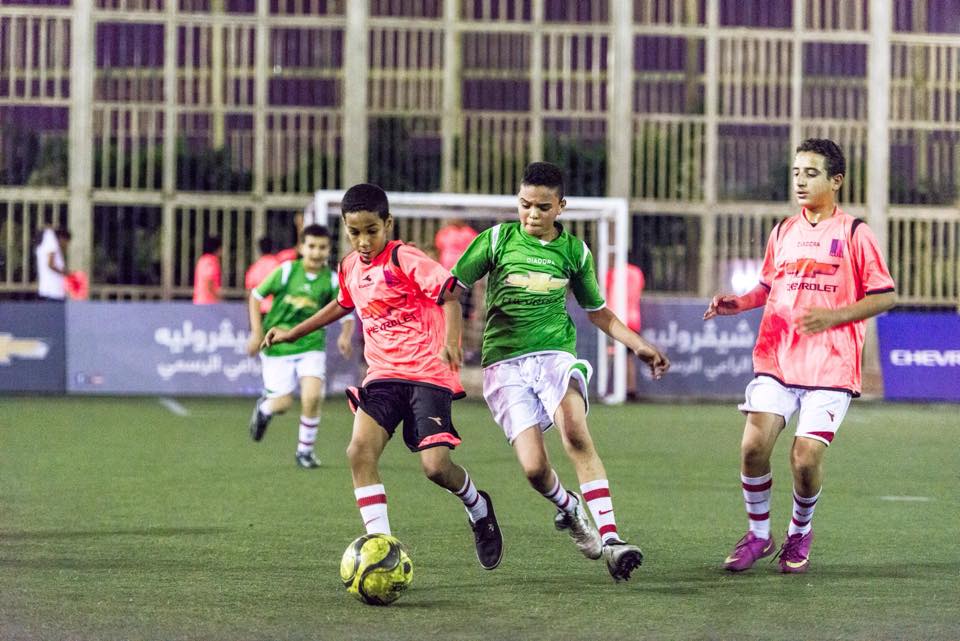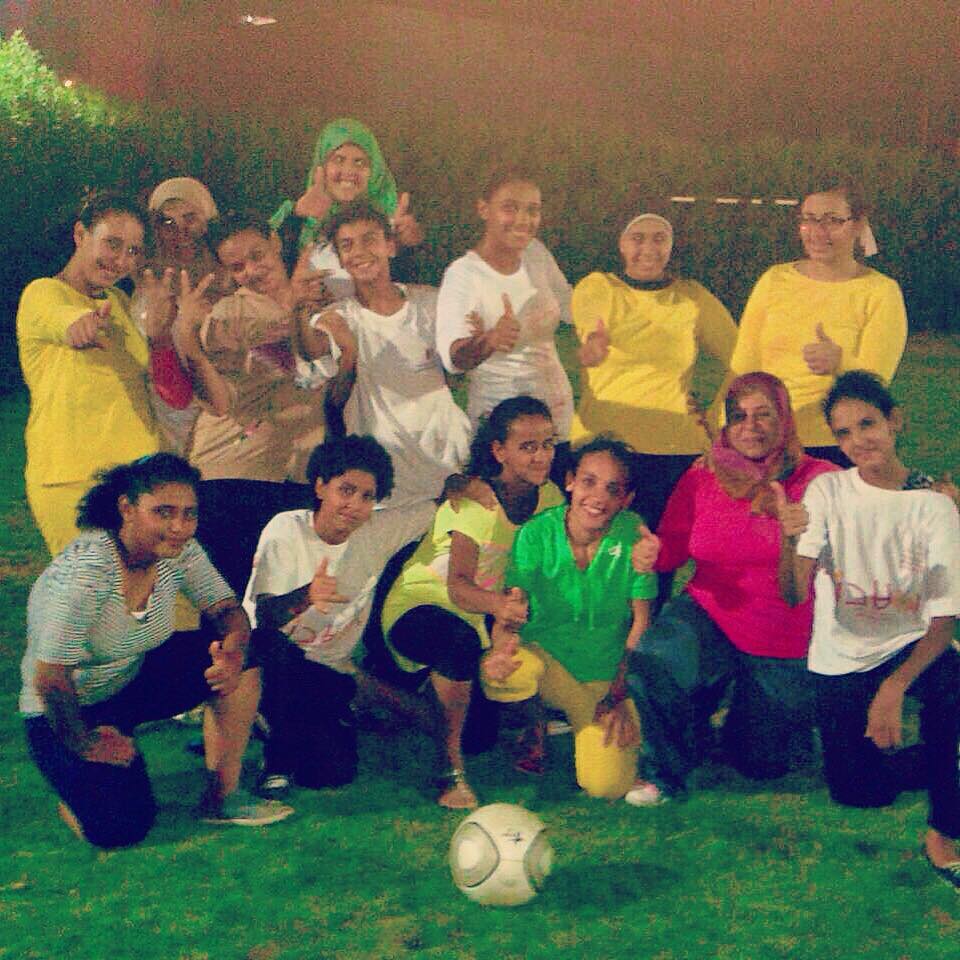
“Sport has the power to change the world,” the late Nelson Mandela once said. It’s a statement that has been reiterated the world over and captures a simple yet undeniable truth.
It rang true when 200 of Cairo’s street children gathered for a football tournament in Fustat last Ramadan, on a pitch that may not have been a permanent home for them, but provided a sanctuary in which they felt they belonged.
It will also ring true when eight young girls travel from Cairo to Amsterdam next month to represent Egypt in the Homeless World Cup (September 12-19, 2015), where they will join teams from 73 other countries to take part in a pioneering social movement that uses football to inspire homeless people to change their own lives.
The driving force behind both initiatives in Egypt is a social enterprise called Nafas, which literally translates to “breath” in Arabic. Often used colloquially as a reference to a cigarette puff, the founders of the organization chose the word Nafas for far deeper connotations.
“The word has a double meaning in our Egyptian streets which is why it is catchy. But for us, we chose it because we’re trying to give a breath of fresh air to our society,” says Nafas co-founder Karim Hosny. “That one word shows that there can be both a negative and a positive perception towards everything. We’re a social enterprise specialized in using football to empower children in need. Working in rehabilitation is a marathon process, which requires a lot of ‘nafas’. So that’s another reason the name made sense for us.”
Nafas took their first steps towards utilizing the power of football to rehabilitate street children and touch the lives of youngsters at risk in Cairo’s slums almost two years ago when Hosny decided to train a group of boys and create a team to represent Egypt in last year’s Street Child World Cup in Rio de Janeiro.
It was a life-altering experience for all involved and Hosny returned from Brazil transfixed with the idea of continuing his work with children with the main goal of “touching as many souls as possible,” he explains.
With the help of his sister Indjy, and friend Mohamed Abouhussein, Hosny began launching football practices in various Cairene neighborhoods, using the help of NGOs like FACE and Ana El Masry to attract children at risk to play the game.
Slums in Egypt are referred to as “Aashwa’eyat” which literally means “haphazard” – a term that reflects the type of lives many of these children lead in the streets and alleys of these neighborhoods. It’s often incredibly difficult to get kids off the streets and gaining their trust can be a fool’s errand at times.
Hosny found football as a useful tool to communicate with these children and gradually, and organically, he managed to make headway in seven different neighborhoods where hundreds of youngsters show up to practice twice a week to play the game.
While renting appropriate pitches is a real challenge – and a huge cost – Hosny has managed to procure locations that are a walking distance from metro stations, with Fustat posing as the mother pitch for the programme.
“The metro is the artery for street children so we made sure our pitches are all next to it,” is how he put it.

Dream team: Hosny (c) with the Nafas staff.
I attended one of the practices held on an artificial turf pitch at Dar El Salam Youth Center, where over 40 boys were separated into groups and going through serious drills on either side of the halfway line.
Hosny hired three coaches to help him run the practices, and they are aided by six assistant coaches who have been chosen from amongst the street children they’re working with.
“I was one of these kids myself so I’m happy that I’m able to give them something useful,” says Mohamed Hassan, an 18-year-old assistant coach who was helping run the practice session.
“Football is the one useful thing that I did in my life and I’m now able to pass on some skills to these children that they can use in their everyday life.”
The kids’ ages vary but the bulk range from nine to 15 or 16 years old. They appear to be relatively disciplined in the session, with the coaches urging them to stay focused every once in a while.
On the sidelines, a social worker from Ana El Masry, named Ashraf, is sat on a bench alongside a medic and they’re watching intently. Ashraf has a notebook in his hand and is creating a database of all the children in attendance. He is taking note of their names, ages, social circumstances – whether they go to school or not, have a home or not, are orphans or have living parents… They share many laughs in between their conversations.
“90 per cent of these children spend their afternoons begging on the street,” says Ashraf, who has been a social worker for 13 years. “When we told them about these practices, they started coming on their own. It’s a new experience for them and it’s taking advantage of something they have passion towards, which is football. Passion is something that is typically missing from their lives and here they can find that. It’s a window for us to reach them, and this can lead to us being able to help them in different ways. Coming here can be a real turning point for them.
“At first they were guarded but then they started opening up when they realized they can trust us. Karim has a very likeable personality and the kids just love him, which helps.
“We can now offer them temporary shelter, try to help their families, talk to their parents and raise awareness, guide them towards school or suggest a way where they can learn a skill to get work.”

Big hit: 24 teams took part in the Ramadan tournament
With presence now in Maasara, Dar El Salam, Fustat, Madinat El Salam, Talbeya, 6 October and Sayeda Zeinab, Nafas are now focused on setting up an amateur league that will pit teams from all those neighborhoods against one another.
The 24-team Ramadan tournament they held recently, sponsored by Chevrolet, served as a prototype for the league which helped Hosny assess the work they’ve done over the past year.
“The kids were very motivated, it was very exciting,” Hosny says of the Ramadan event. “We were surprised by the level of commitment even though there were no monetary prizes. But I think they got caught up in the competition, it was great.
“We got connected to the kids more because we got to see them all on one pitch for a whole month so it built a strong connection between us – our staff and the children. The children were more connected to our social platforms so we were able to communicate with them better. I think it increased the trust because they saw something real happening and they’re looking for more things to happen in the future.
“But we saw that we need better infrastructure and better equipment in the different areas. We also need to focus and make sure that the children who are really in need are integrated better.”

Nafas are looking to see the league come to life next month, but first, they travel to Amsterdam with their first girls’ team next month for the Homeless World Cup. They partnered with an NGO called ‘Banaty’ to create a squad and they had the added bonus of using a ready-made pitch on the premises of the organization. The girls are aged 16 to 19 and had never played football before in their lives – all bar one of them.
The Homeless World Cup has a unique four-a-side format which is played on smaller pitches, surrounded by barriers so there are no out calls and with 1.10m x 4m goals that require lower kicking. Hosny says it’s a format that mimics the fast-paced dynamic of children’s lives on the street and resembles the football they’d typically play in an alley.
Nafas survived the bureaucratic nightmare of getting birth certificates, ID cards and passports for all eight girls who are bound for Amsterdam and they finally got their visas on Sunday.
“Today they were euphoric because they got the visa, so they got really excited,” said Hosny. “They also played their first friendly and they played well. Considering they didn’t know how to play football to begin with, there was this rush because they felt like a real team.
“The young ones from Banaty who were watching on the sidelines are really looking up to them and they wish they could be like them. So that’s the impact they can have on their whole organisation.
“So even if only eight girls are traveling, there’s a positive ripple effect. One of the girls watching the match today said ‘I felt like I was playing with them’. They’re really into it. So the future of working with the girls has a lot of potential.”
Hosny admits that all the work they’ve done so far is only a fraction of what they wish to achieve but that the positives are starting to emerge.
“I feel the kids have a place to breathe, they’re committed to something that they trust. They’re seeing that if they’re giving something, they’re also receiving, which is not usually the case in their other activities. So I think seeing them have this belief or hope has been the greatest outcome so far,” he says.
Mandela’s famous speech about sport continues by saying: “It speaks to youth in a language they understand. Sport can create hope where once there was only despair.”
The children of Nafas can certainly attest to that.
**For those interested in donating to the organization or wanting to keep up to date with Team Egypt’s progress at the Homeless World Cup, visit their Facebook page here **